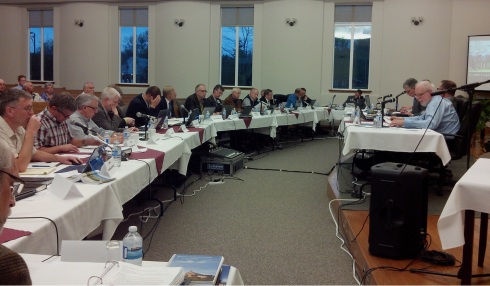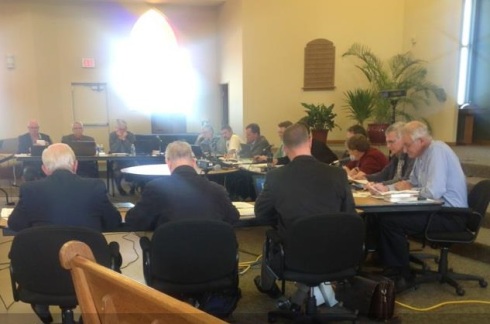Herman Bavinck (1854-1921) stands with John Calvin and Abraham Kuyper as one of the greatest Reformed theologians. He’s renowned for being biblical, confessional, and incisive. It’s been especially the publication of his Reformed Dogmatics in English that’s brought him to prominence in our day. Biographies by Ron Gleason and, more recently James Eglinton, have certainly helped as well. However, most of Bavinck’s corpus remains in Dutch. Eric Bristley’s Guide to the Writings of Herman Bavinck illustrates the vastness of this corpus, listing hundreds of his articles and books.
I want to introduce to you one of these untranslated works, one that was controversial in its day, and still bears some relevance for today. In 1918, Bavinck published his book De vrouw in de hedendaagsche maatschaapij (Women in Contemporary Society). It’s a comprehensive look at questions Dutch society was wrestling with in the early 20th century, particularly under the influence of first-wave feminism. It deals with what Scripture teaches about women and how biblical teaching applies today, but also surveys church history – Bavinck’s typical approach. In what follows, I’ll summarize what he says in his chapter about women in the church. I’ll be simply reporting what he writes. In other words, this is only descriptive and not analytical/critical.
“Women in the Church” is the title of chapter 10 of De vrouw in de hedendaagsche maatschaapij, the second-last chapter of the book. It begins with the pre-Reformation church, noting the role of nuns in Christian philanthropy. During the Reformation, some efforts were made to reorient this kind of diaconal service among women, but these efforts were hardly successful. In some areas, efforts were made to have deaconesses, but the Synod of Middelburg in 1581 decided that it was not advisable to reintroduce the office of deaconess in the Reformed churches of the Netherlands. In exceptional circumstances such as a time of plague, however, the work of deacons could be done by their wives or other women. According to Bavinck, this happened in places like Middelburg, Utrecht, Amsterdam, and Emden.
Bavinck then turns his attention to a historical overview of women as pastors/preachers. He notes that the Salvation Army was among the first to give a prominent role to women as church leaders. This was owing especially to Catherine Booth, who co-founded the Salvation Army with her husband William. Catherine Booth argued for the right for women to be preachers alongside men. Others who pioneered women’s ordination were the Quakers, Congregationalists, Universalists, Unitarians, Methodists and, in the Netherlands the Mennonites and the Remonstrants.
Bavinck evaluates all these developments as being unbiblical. He notes that Christ entrusted the ministry of the word to men, first to the apostles, and then to pastors and teachers. The apostolic church never had any official ministry of the word and sacrament by women, nor any government of the church by women. The apostle Paul said that women are to be silent in the congregation because to do otherwise would violate the natural order grounded in creation.
Bavinck has a more positive evaluation of women serving in a general diaconal role. In fact he says, the church “cannot do without women in this work.” This includes things like Sunday school, care for the poor and the sick, care for the elderly, the support of pregnant women, and more. He doesn’t think these activities need to be directly under the oversight of the church as an institution, but the church does have the calling to promote this kind of work where women use their gifts.
That leads into a discussion of the active role that women can play in missions. He notes some figures for women serving on the mission field. According to his figures, 160 women from America were serving as missionary doctors, and 2458 as “sisters in the mission” (zendingszusters). Canada had 23 and 220, while Australia and New Zealand 2 and 94. He also draws attention to the role that “missionary women’s associations” play on the home front, promoting and supporting the work of missions around the world. Bavinck presents all of this in a positive light.
Finally Bavinck comes to the controversial topic of women voting for office bearers in the church. He begins this discussion with an overview of where things stand: he notes that there are many churches in America, Australia, Denmark, Norway, Iceland, and Switzerland where women vote. He points out that it was discussed and defended in the Netherlands as early as 1898 by Abraham Kuyper, as well as by pastors A.D.C Kok and C. Lindeboom.
Bavinck notes that the issue did not seem to be a pressing one in the Netherlands of his day. Unlike in other countries, men were actively involved in Dutch church life and there didn’t seem to be any desire to have women voting for office bearers. He writes that, with such indifference, it would be foolish to press the issue.
However, he notes that if we discuss it in principle, “there is little ground to condemn it.” Bavinck argues that women are equal members of the church with men. They have just as much an interest in having good office bearers as the men do. Because of their nature as women, they tend to actually have quite a great deal of interest in religious matters. Moreover, there are large numbers of widows, women married to “religiously indifferent men,” or women married to men who belong to another church. Without being able to vote, such women are all stripped of the opportunity to have an influence on church life.
Bavinck strengthens his argument by noting that while women under the authority of their husbands in the home, as church members they receive the same benefits and should receive the same rights. He notes that young male communicant members who still live with their parents are subordinate to those parents, but yet they have the right to vote. This is unfair. Bavinck says the injustice becomes worse because women are allowed to raise objections to the election of an office bearer – yet they cannot vote. Then he notes that the vote in the church is not an exercise of power. The congregation only points out its preferences for office bearers; the consistory is responsible to call and appoint.
He maintains that there is only one objection with any weight: if women can vote in the church, it will not be long before the church will be forced to have women standing as candidates. In other words, women’s voting will lead to women’s ordination.
But Bavinck notes that this is an argument from fear. It is an argument that often persuades fearful minds concerned about novelties in the church. However, he points out, if the Scriptures are so strong that women may not serve as office bearers, then we have nothing to fear. The clarity of the Bible should prevent any such development.
He then points out that it’s not unusual for people to be able to vote and not be able to stand as a candidate. One does not follow from the other. The requirements for eligibility to vote are often different from the eligibility requirements to stand as a candidate. In the Dutch situation of his time, a public servant, clergyman or teacher was not allowed to be a candidate in a city council election. Writes Bavinck, “Thus eligibility to any office in Scripture is bound by certain requirements, 1 Timothy 3; but no such limits are placed on the power to vote.”
Finally, Bavinck comes to a brief discussion of Scripture. In Acts 1:15, in the meeting of the 120 people to replace Judas as apostle, women were certainly there (Acts 1:14). True, Peter addresses the gathering as “Men and Brothers.” That was common practice and it still was in the church of Bavinck’s day. Even though they were present the sisters were never mentioned. It’s therefore uncertain as to whether or not the women present participated in the process. Other passages like Acts 13:3 and Acts 14:23 likewise do not shed any light. Bavinck concludes that while Scripture limits the offices of the church to men, there is no definite and clear statement about who may vote.
Indeed, it seems to Bavinck, in the ancient church women were not excluded from choosing bishops or making contributions to other ecclesiastical matters. He points out that, in his day, in Germany there were Roman Catholic congregations where independent women had long been allowed to vote on the choice of a pastor. Similar situations occur in the Netherlands, he says, proving that women have not always been excluded from the voting process in the congregation just because they are women.
In his biography, Ron Gleason describes the reception of this book (pp.415-416). It was especially the matter of women voting in the church that led to some negative evaluations by men such as Dammes Fabius and Seakle Greijdanus. Gleason relates that Abraham Kuyper wrote his last letter to Bavinck about this book and indicated that the two of them had significant differences on the subject. However, a footnote surmises that these differences may have been about women’s suffrage in civil society. Given how Bavinck asserts that Kuyper defended women’s voting in the church, Gleason may be correct.
(Note: I haven’t yet read James Eglinton’s biography and what he may have to offer on this – it’s on my list of must-reads for 2021.)



